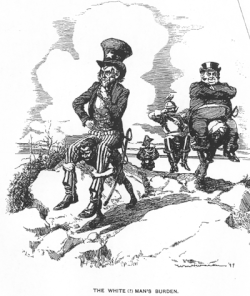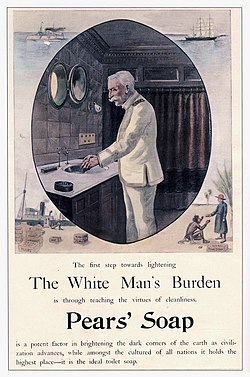The White Man's Burden
"The White Man's Burden" ("beban orang kulit putih") adalah puisi karya penyair Inggris Rudyard Kipling.


Puisi ini awalnya diterbitkan di majalah McClure's tahun 1899 dengan subjudul The United States and the Philippine Islands.[1] Puisi ini juga awalnya ditulis dalam rangka Diamond Jubilee Ratu Victoria, tetapi diganti dengan puisi "Recessional"; Kipling memasukkan kata "Burden" untuk mencerminkan kolonisasi Amerika Serikat di Filipina yang baru saja mengalahkan Spanyol dalam Perang Spanyol–Amerika Serikat.[2] Puisi ini terdiri dari tujuh stanza dengan skema rima yang teratur. Secara gamblang, puisi ini tampak seperti perintah retoris kepada orang kulit putih untuk mengkoloni dan menguasai negara lain demi keuntungan orang kulit putih (baik rakyat maupun tugasnya dianggap mewakili kata "burden" atau "beban" di judul puisi).
Meski puisi Kipling mencampurkan desakan kolonisasi dengan peringatan akan biaya kolonisasi, kaum imperialis di Amerika Serikat menafsirkan frasa "beban orang kulit putih" sebagai pembenaran bahwa imperialisme adalah hal yang terhormat.[3][4][5][6][7] Karena tema dan judulnya, puisi ini menjadi lambang rasisme Eurosentris dan aspirasi Barat untuk mendominasi negara-negara berkembang.[8][9][10] Satu abad setelah terbit, puisi ini masih membangkitkan emosi yang kuat dan dapat dianalisis dari berbagai sudut pandang.
Lihat pula
suntingCatatan kaki
sunting- ^ "The White Man's Burden". McClure's Magazine 12 (Feb. 1899).
- ^ Stephen Greenblatt (ed.), Norton Anthology of English Literature, New York 2006 ISBN 0-393-92532-3.
- ^ Zwick, Jim (December 16, 2005). Anti-Imperialism in the United States, 1898–1935. Diarsipkan dari versi asli tanggal 2002-09-16. Diakses tanggal 2015-06-03.
- ^ Miller, Stuart Creighton (1982). Benevolent Assimilation: The American Conquest of the Philippines, 1899–1903. Yale University Press. ISBN 0-300-03081-9. p. 5: "...imperialist editors came out in favor of retaining the entire archipelago (using) higher-sounding justifications related to the "white man's burden."
- ^ Judd, Denis (June 1997). "Diamonds are forever: Kipling's imperialism; poems of Rudyard Kipling". History Today. 47 (6): 37.: "Theodore Roosevelt...thought the verses 'rather poor poetry, but good sense from the expansionist stand-point'. Henry Cabot Lodge told Roosevelt in turn: 'I like it. I think it is better poetry than you say'."
- ^ Examples of justification for imperialism based on Kipling's poem include the following (originally published 1899–1902):
- Opinion archive, International Herald Tribune (February 4, 1999). "In Our Pages: 100, 75 and 50 Years Ago; 1899: Kipling's Plea". International Herald Tribune: 6.: "An extraordinary sensation has been created by Mr. Rudyard Kipling's new poem, The White Man's Burden, just published in a New York magazine. It is regarded as the strongest argument yet published in favor of expansion."
- Dixon, Thomas (1902). The Leopard's Spots – A Romance of the White Man's Burden 1865–1900.. Full text of a novel by Thomas Dixon praising the Ku Klux Klan, published online by The University of North Carolina at Chapel Hill.
- ^ Pimentel, Benjamin (October 26, 2003). The Philippines; "Liberator" Was Really a Colonizer; Bush's revisionist history. The San Francisco Chronicle. hlm. D3.: charactising the poem as a "call to imperial conquest".
- ^ "Eurocentrism". In Encyclopedia of the Developing World. Ed. Thomas M. Leonard, Taylor & Francis, 2006, ISBN 0-415-97662-6, p. 636.
- ^ Chisholm, Michael (1982). Modern World Development: A Geographical Perspective. Rowman & Littlefield, 1982, ISBN 0-389-20320-3, p.12.
- ^ Mama, Amina (1995). Beyond the Masks: Race, Gender, and Subjectivity. Routledge, 1995, ISBN 0-415-03544-9, p. 39.
Referensi
sunting- A Companion to Victorian Poetry, Alison Chapman; Blackwell, Oxford, 2002.
- Chisholm, Michael (1982). Modern World Development: A Geographical Perspective. Rowman & Littlefield, 1982, ISBN 0-389-20320-3.
- Cody, David. The growth of the British Empire. The Victorian Web, University Scholars Program, National University of Singapore, November 2000.
- Crosby, Ernest (1902). The Real White Man's Burden. Funk and Wagnalls Company, 32–35.
- Dixon, Thomas (1902). The Leopard's Spots – A Romance of the White Man's Burden 1865–1900.
- Encyclopedia of India. Ed. Stanley Wolpert. Vol. 3. Detroit: charles Scribner's Sons, 2006, p. 35–36. 4 vols.
- "Eurocentrism". In Encyclopedia of the Developing World. Ed. Thomas M. Leonard, Taylor & Francis, 2006, ISBN 0-415-97662-6.
- Greenblatt, Stephen (ed.). Norton Anthology of English Literature, New York 2006 ISBN 0-393-92532-3
- Kipling. Fordham University. Full text of the poem.
- Labouchère, Henry (1899). "The Brown Man's Burden"Diarsipkan 2009-06-22 di Wayback Machine..
- Mama, Amina (1995). Beyond the Masks: Race, Gender, and Subjectivity. Routledge, 1995, ISBN 0-415-03544-9.
- Miller, Stuart Creighton (1982). Benevolent Assimilation: The American Conquest of the Philippines, 1899–1903. Yale University Press. ISBN 0-300-03081-9.
- Murphy, Gretchen (2010). Shadowing the White Man’s Burden: U.S. Imperialism and the Problem of the Color Line. NYU Press. ISBN 978-0-8147-9619-1
- Pimentel, Benjamin (October 26, 2003). "The Philippines; "Liberator" Was Really a Colonizer; Bush's revisionist history". The San Francisco Chronicle: D3.
- Sailer, Steve (2001). "What Will Happen In Afghanistan?". United Press International, 26 September 2001.
- "The White Man's Burden." McClure's Magazine 12 (Feb. 1899).
- The Shining. Jack Nicholson's character Jack, uses the phrase to refer to whiskey.